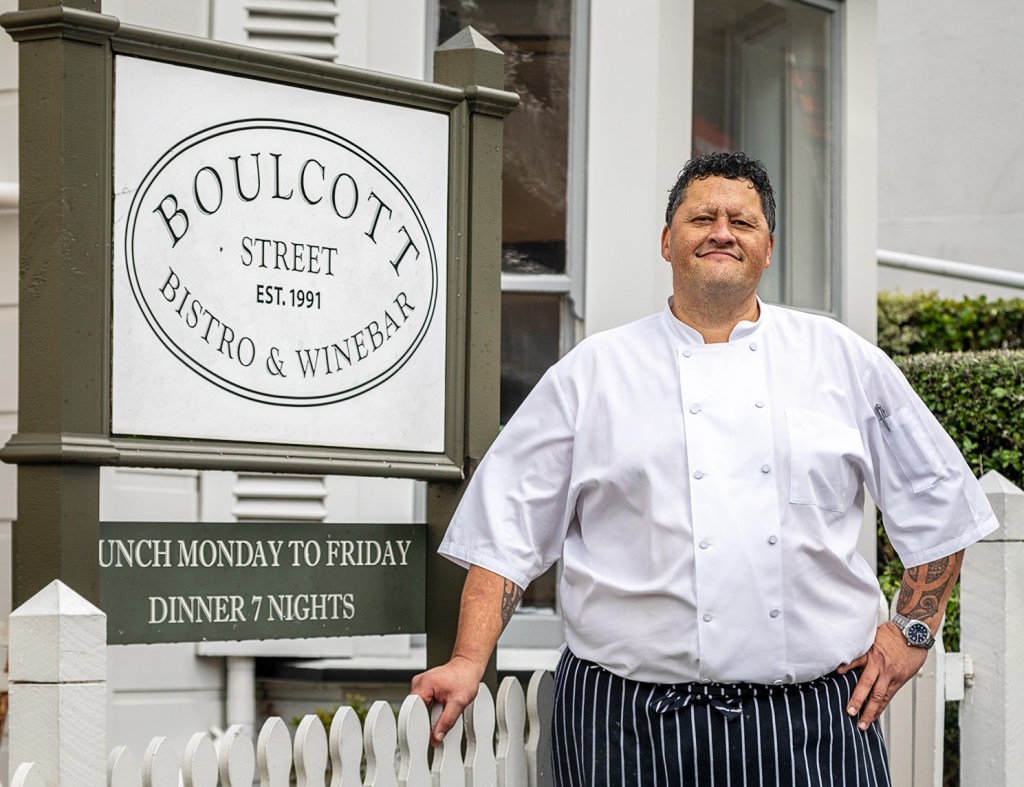New Zealand punches above its weight in everything that matters. From sport to science, Kiwis have been internationally recognised as among the best in the world. It’s the same in hospitality, with local chefs known for their great skills and ability. Many have worked in – or run – some of the best restaurants here and in the world.
With over 30 years’ experience, Wellington-based multi-award-winning chef Rex Morgan is a familiar face. He’s a New Zealand Beef & Lamb Ambassador, culinary judge and TV personality, and well-known to customers of the popular Boulcott Street Bistro restaurant where he is co-owner, overseeing the kitchen side of the business.
He’s also a fan of New Zealand’s cookery apprenticeships.
“Any good chef should seriously consider taking on an apprentice,” says Rex. “You get to hands-on train these guys your way, with the guidance of ServiceIQ. They are internally assessed as you go; no need for lengthy block courses or losing them a day each week for courses.
“An apprentice can become a real asset – your own home-made product. The training, supported by industry training organisation ServiceIQ, can adapt to your business. Timing of what is taught, when and how suits the business. The record-keeping shows where the trainee is at, where they can go next, and what help they might need from their chef or from ServiceIQ.”
Apprentice is a definite
Rex notes that the Boulcott Street Bistro has a full team right now. “I recently had an apprentice. If we needed a new team member, then an apprentice would be a definite. There are so many good things about having a person with the right attitude on a cookery apprenticeship, including creating an asset for the company as well as the industry. The government’s new Apprenticeship Boost helps an employer with up to $18,000 for the first two years. But that ‘right attitude’ – from both the potential apprentice and the chef –must come first.”
Attitude is something Rex mentions a lot. He has some great advice for chefs thinking about taking on a cookery apprentice, whether that be in a restaurant or catering setting.
“As a chef with an apprentice, you teach the skills and build the passion. That requires the right attitude on both sides. I’ve done a fair bit of teaching and I love seeing people learn and grow. You have to accept that at some point they may well want to leave and get experience elsewhere. I think that makes a good chef even better.
“That all takes time, as do the teaching and verification needed. If you don’t agree with all that, or can’t commit to the time, then having an apprentice might not be right for you. It’s still worth talking to ServiceIQ though, to really understand the process. It has changed over the years, so what you’ve heard or experienced might not be today’s reality.
“It’s just as important that the apprentice is keen. They need to understand the realities of hospitality and working in a kitchen and – despite that – still want to be there. They also need to understand the benefits too – that they are earning and learning, that what they’re doing is building a life-long career that offers global opportunities.
“As with most things in life – the more you put in, the more you get out. The great thing about the ServiceIQ cookery team is that they understand both want the employer and apprentice needs, and what the responsibilities of each are. They are upfront, practical and offer ongoing support to the business and the apprentice chef and will explain what’s needed and set out the commitment from all three parties (chef, apprentice and the ServiceIQ advisor). It really helps to have an early conversation with a ServiceIQ advisor, whether you’re just toying with the idea or already have a person in mind for the apprenticeship. It’s valuable – but free – advice.”
Your next apprentice is out there
Rex acknowledges that it’s easier to talk about having the right person – with the right attitude – than it can be finding one.
“It can seem a bit ‘yeah, right!’ but the right people are out there. Over the years, I’ve given talks to local school hospitality classes and there are kids there that you know are keen. That might change once they get in the kitchen, but a part-time job, for example kitchenhand or basic prepping, will help them and you see if they have what it takes. Chefs need to remember how we started out, and what might have helped or hindered us.
“These days, apprenticeships are available to anyone. The age limit has gone, so good people – with some life experience and maturity – are looking for a career change. Some will make great apprentices. If you ask around, you can find committed people.”
As with other aspects of cookery apprenticeships, Rex says that the industry training organisation, ServiceIQ, might be able to help a business find a good potential apprentice as it’s closely involved with hospitality teaching in schools, and with some of the school cookery competitions.
“If it’s right for the business, you really should consider an apprentice, and you really should talk to ServiceIQ to see if it’s right. And, if it is, see what help and support they can give you. With cookery apprenticeships being fees-free, plus now having access to extra government funding, there’s probably never been a better time to consider the apprentice option.”
There is information on ServiceIQ’s three hospitality apprenticeships (cookery, catering, and food & beverage), plus a wealth of other on-job training options at https://www.serviceiq.org.nz/training/hospitality/.








